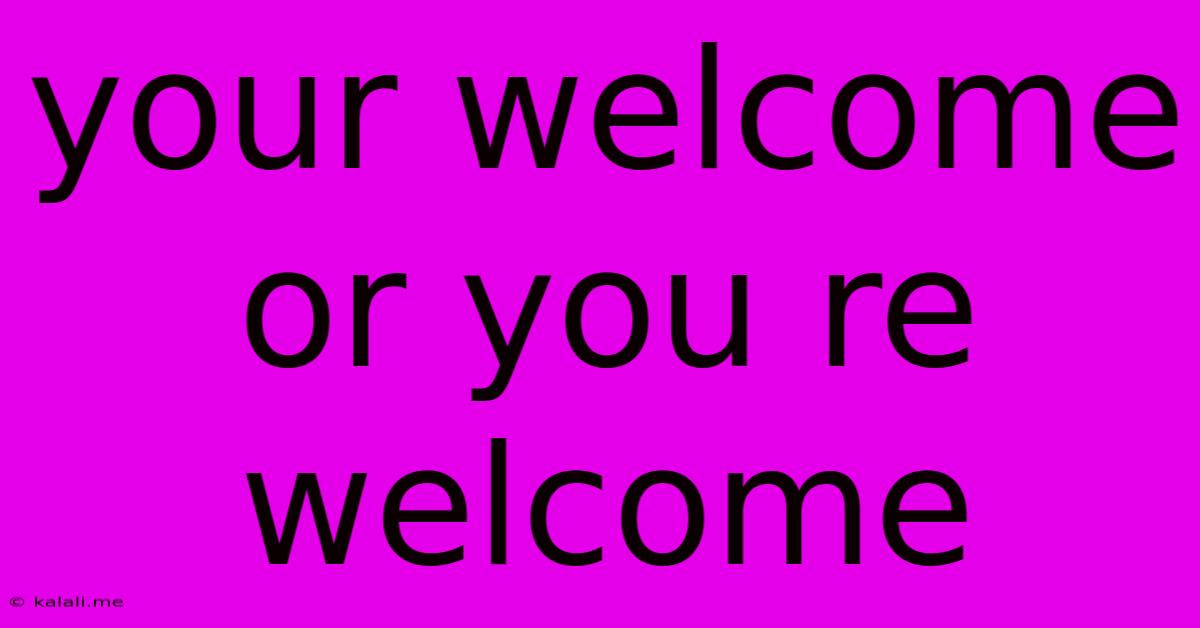Your Welcome Or You Re Welcome
Kalali
May 19, 2025 · 2 min read

Table of Contents
"You're Welcome" vs. "Your Welcome": A Simple Guide to Choosing the Right Phrase
Choosing between "you're welcome" and "your welcome" might seem trivial, but this seemingly insignificant grammatical choice can significantly impact how others perceive your communication. This article will clarify the correct usage, explore the nuances of each phrase, and offer helpful tips to ensure you always choose the most appropriate response. Understanding this difference can elevate your professionalism and overall communication skills.
Understanding the Difference: A Matter of Contraction
The core difference lies in the contraction. "You're welcome" is the correct and grammatically sound phrase. It's a contraction of "you are welcome," a polite expression acknowledging gratitude. "Your welcome," on the other hand, is grammatically incorrect. It implies possession ("your" meaning belonging to you), making it nonsensical in this context. Imagine someone thanking you for holding the door, and you responding, "Your welcome." It sounds strange, right?
Why "You're Welcome" is the Preferred Choice
- Grammatical Accuracy: This is the most crucial reason. Using "you're welcome" demonstrates proper English grammar and shows attention to detail.
- Politeness and Professionalism: In formal settings, using the correct phrase shows respect and professionalism. It contributes to a positive and credible image.
- Clarity and Understanding: Using the correct grammar ensures your message is clear and easily understood, avoiding any potential confusion.
Beyond the Basics: Alternatives to "You're Welcome"
While "you're welcome" is perfectly acceptable in most situations, consider these alternatives to add variety and nuance to your responses:
- "No problem." This is a more casual and less formal alternative.
- "My pleasure." This conveys a greater sense of willingness and enthusiasm.
- "It was nothing." This downplays the effort involved, making the recipient feel less indebted.
- "Anytime!" This implies a willingness to help again in the future.
- "Happy to help!" This is a more empathetic and friendly response.
Choosing the Right Phrase for the Right Situation
The best phrase to use depends heavily on context and your relationship with the person you're addressing. Consider:
- Formality: For formal situations, stick with "you're welcome."
- Relationship: With close friends and family, more casual options like "no problem" are perfectly acceptable.
- Tone: Match your response to the overall tone of the conversation.
Common Mistakes and How to Avoid Them
The most common mistake is using "your welcome." Proofreading your written communication and being mindful of your spoken words will help avoid this error. Pay attention to the contraction; if you're unsure, break it down to "you are welcome" to ensure accuracy.
Conclusion: Mastering the Art of Polite Acknowledgement
Mastering the difference between "you're welcome" and "your welcome" is a simple yet effective way to improve your communication skills. By using the correct phrase and considering alternative responses, you can ensure your communication is both grammatically correct and appropriately nuanced for any situation. Remember, clear and polite communication strengthens relationships and enhances your overall impression.
Latest Posts
Latest Posts
-
Can You Put A Plate In The Oven
May 19, 2025
-
How To Strip Paint Off A Deck
May 19, 2025
-
Why Did Voldemort Kill The Potters
May 19, 2025
-
How To Remove A Velux Window Blind
May 19, 2025
-
Can You Square Root A Negative
May 19, 2025
Related Post
Thank you for visiting our website which covers about Your Welcome Or You Re Welcome . We hope the information provided has been useful to you. Feel free to contact us if you have any questions or need further assistance. See you next time and don't miss to bookmark.